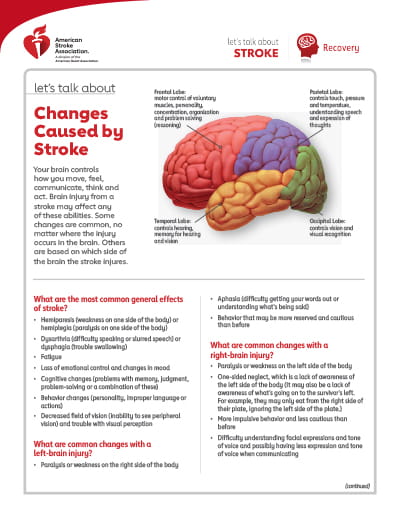Let’s Talk About Changes Caused by Stroke
 Your brain controls how you move, feel, communicate, think and act. Brain injury from a stroke may affect any of these abilities. Some changes are common, no matter where the injury occurs in the brain. Others are based on which side of the brain the stroke injures.
Your brain controls how you move, feel, communicate, think and act. Brain injury from a stroke may affect any of these abilities. Some changes are common, no matter where the injury occurs in the brain. Others are based on which side of the brain the stroke injures.
- Frontal Lobe: motor control of voluntary muscles, personality, concentration, organization and problem solving (reasoning)
- Parietal Lobe: controls touch, pressure and temperature, understanding speech and expression of thoughts
- Temporal Lobe: controls hearing, memory for hearing and vision
- Occipital Lobe: controls vision and visual recognition
What are the most common general effects of stroke?
- Hemiparesis (weakness on one side of the body) or hemiplegia (paralysis on one side of the body)
- Dysarthria (difficulty speaking or slurred speech) or dysphagia (trouble swallowing)
- Fatigue
- Loss of emotional control and changes in mood
- Cognitive changes (problems with memory, judgment, problem-solving or a combination of these)
- Behavior changes (personality, improper language or actions)
- Decreased field of vision (inability to see peripheral vision) and trouble with visual perception
What are common changes with a left-brain injury?
- Paralysis or weakness on the right side of the body
- Aphasia (difficulty getting your words out or understanding what’s being said)
- Behavior that may be more reserved and cautious than before
What are common changes with a right-brain injury?
- Paralysis or weakness on the left side of the body
- One-sided neglect, which is a lack of awareness of the left side of the body (It may also be a lack of awareness of what’s going on to the survivor’s left. For example, they may only eat from the right side of their plate, ignoring the left side of the plate.)
- More impulsive behavior and less cautious than before
- Difficulty understanding facial expressions and tone of voice and possibly having less expression and tone of voice when communicating
What are common emotional effects of stroke?
- Depression
- Apathy and lack of motivation
- Frustration, anger and sadness
- Pseudobulbar affect, or PBA, also called reflex crying or emotional lability (emotions may change rapidly and sometimes not match the mood)
- Denial of the changes caused by the brain injury
Will I get better?
Every person and every stroke is unique. In most cases, people get better over time. The effects of a stroke are greatest right after the stroke. From then on, how fast and how much you improve depend on the extent of the brain injury and your rehabilitation.
- Some improvement occurs spontaneously and relates to how the brain works again after it’s been injured.
- Stroke rehabilitation programs help you improve your abilities and learn new skills and coping techniques.
- Rehabilitation begins often within a day or two after the stroke once you’re medically stable.
- Depression after stroke can interfere with rehabilitation. So it’s important to treat it.
- Improvement often occurs most quickly in the first months after a stroke. Then it continues over years, perhaps at a slower pace, with your continued efforts.
How can I learn more?
- Call 1-888-4-STROKE (1-888-478-7653) or visit stroke.org to learn more about stroke or find local support groups.
- Sign up for our monthly Stroke Connection e-news for stroke survivors and caregivers at StrokeConnection.org.
- Connect with others who have also had an experience with stroke by joining our Support Network at stroke.org/SupportNetwork.
Do you have questions for your doctor or nurse?
Take a few minutes to write down your own questions for the next time you see your health care professional. For example:
Can other areas of the brain help the damaged part of the brain?
How has my stroke affected me?
We have many other fact sheets to help you make healthier choices, manage your condition or care for a loved one.
Visit stroke.org/LetsTalkAboutStroke to learn more
© Copyright 2022 American Heart Association, Inc., a 501(c)(3) not-for-profit. All rights reserved. American Stroke Association is a registered trademark of the AHA. Unauthorized use prohibited. DS18984 3/22